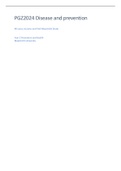Summary
Summary PGZ2024 Disease and Prevention (cases with all literature, lectures and trainings)
- Course
- Institution
- Book
This is a summary of all cases and lectures of course 4 Disease and Prevention. The cases are very extensive by using all literature. Sources are mentioned in the document. Additions from the tutorial are marked in red. The health counseling training and the visit Maastricht Study are also included...
[Show more]




